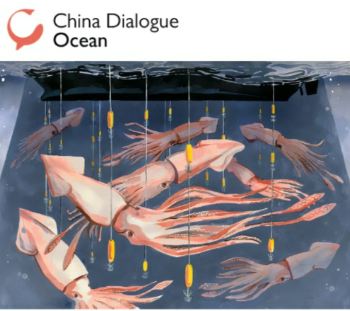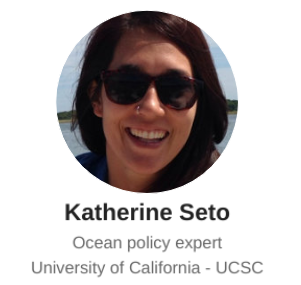|

Illustration: Luisa Rivera / China Dialogue Ocean
Squid fisheries are booming in a regulatory vacuum
 WORLDWIDE WORLDWIDE
Thursday, June 01, 2023, 07:10 (GMT + 9)
The following is an excerpt from an article published by China Dialogue Ocean:
The expansion of squid fisheries in parts of the high seas has left scientists and conservationists concerned about the potential impacts on ocean life
In Peru, it goes by pota. In Chile, it’s known as jibia, and in Mexico “the red devil” after its tendency to turn rouge when hooked. In English, it is the Humboldt squid. However you name it, Dosidicus gigas is the most heavily fished of the world’s squid species.

A Humboldt squid – the most heavily fished squid species – and a multi-pronged jigging hook (Image: Alamy)
In recent decades, industrial vessels have increasingly targeted this species on the high seas – beyond country’s exclusive economic zones – while regulations have failed to keep pace. The emergence of a squid fishery in the south-east Pacific Ocean has garnered much attention. But it is part of a wider trend in international waters, where such fisheries are now booming in a regulatory vacuum, leaving experts worried for the health of stocks and the larger ocean ecosystem.
“I am concerned about the massive catch volume, the number of vessels going for squid in these various areas,” says Phillip Chou, senior director of global policy at Oceana, an international oceans-focused nonprofit. Meanwhile, Will McCallum, co-executive director of Greenpeace UK, describes squid fishery growth as “one of the most egregious examples of the industrialisation of the high seas”, adding that “it’s happened overnight”.

An industrial squid jigger in the south-west Atlantic. To attract squid, such vessels operate at night using bright lights and lures that they jig up and down. (Image © Martin Katz / Greenpeace)
Squid are invertebrates with an elongated soft body, typically topped with eight arms and two longer tentacles. They are a type of cephalopod mollusc found in every ocean, with at least 290 known species. In the past few decades, the global catch of cephalopods – a class also including cuttlefish and octopus – has risen tenfold, from around 500,000 tonnes annually in 1950 to a peak of 4.85 million tonnes in 2014. The most rapid increases have been in squid fisheries, to the extent that squid now represent a sizeable portion of the overall landings in some ocean regions.
Squid are targeted for human consumption, and in some regions, the increasing catch has coincided with a decline in traditional fisheries, suggesting that squid is becoming a market substitute for fish. In the north-west Pacific, for instance, declines in traditional fisheries, such as Japanese pilchard and Alaskan pollock, have been offset by a boom in cephalopod landings, mostly of squid.

Local fishers unload their catch of squid in north-western India. Squid is vital for food security in many coastal communities. (Image: Pep Roig / Alamy)
While squid populations aren’t currently classified as endangered, scientists say that a recent rapid uptick in unregulated fishing is putting these stocks at risk. “Squid is very important for ecosystems. It’s not just food for humans, but for everything else in the ocean,” says Alexander Arkhipkin, a senior fisheries scientist at the Falkland Island Fisheries Department.
According to a study published in March in the journal Science Advances, squid fisheries are now extensive, and growing, on the high seas. In the four-year period from 2017 to 2020, the fishing effort of the global squid fleet increased 68%, from 149,000 fishing days per year in 2017 to 251,000 in 2020.
.jpg)
Data source: Fishing through the cracks, Science Advances • Graphic: China Dialogue Ocean
Note: The four areas included are where the greatest level of squid fishing takes place on the high seas. Overall growth in fishing was largely driven by increases in the south-east Pacific and north-west Indian oceans.
 The vessels targeting squid offshore in unregulated areas are mostly industrial squid jiggers. These highly mobile vessels move easily between fishing grounds and stay at sea for long periods, typically three months to a year, to maximise their catch based on seasonal abundance. Vessels flagged to various countries fish these unregulated grounds, but Chinese-flagged vessels dominate the sector both in terms of numbers and hours fished. The vessels targeting squid offshore in unregulated areas are mostly industrial squid jiggers. These highly mobile vessels move easily between fishing grounds and stay at sea for long periods, typically three months to a year, to maximise their catch based on seasonal abundance. Vessels flagged to various countries fish these unregulated grounds, but Chinese-flagged vessels dominate the sector both in terms of numbers and hours fished.
According to the recent study, which was led by ocean policy expert Katherine Seto of the University of California, Santa Cruz, 86% of squid fishing effort is now concentrated in unregulated areas, and 92% of that fishing is by Chinese-flagged vessels. “There are increasing efforts, increasing fishing vessels, increasing fishing hours, and they tend to be increasing disproportionately in unregulated spaces,” says Seto. [continues...]
Author/Source: Olive Heffernan / China Dialogue Ocean | Read the full article by clicking the link here
editorial@seafood.media
www.seafood.media
|



